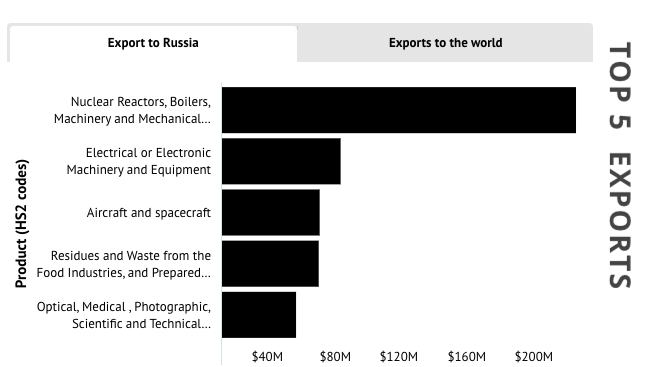

Canadian sanctions against Russia have been in force since 2014 when Russia forcibly annexed Ukraine’s Crimean Peninsula.
Canada recently warned these sanctions could become “severe” if Russia makes further moves against Ukraine. But despite current sanctions, trade between Canada and Russia has continued. In 2020, Canada received more than $1 billion in imports from Russia and delivered more than $600 million in exports, according to data from the International Trade Centre.
The ITC’s Trade Map shows Canada’s exports to Russia in 2020 totalled $617 million, a third of which included nuclear reactors, machinery, mechanical appliances, and boilers. Other significant exports were helicopters and airplanes, spacecraft, and agricultural machinery.
The $1 billion in imports was also a relatively small fraction of Canada’s total import value of approximately $541.7 billion.
“Of all the rich countries that could impose sanctions, Canada has the least to lose,” Mark Manger, associate professor of political economy and global affairs at the Munk School, told CTVNews.ca in a phone interview. “Basically, anything that Russia exports, Canada exports as well, just to different partners.”
Manger, who’s also director of the Global Economic Policy Lab, said Canada could theoretically supplant Russia in world markets. “If sanctions are imposed on Russia, the price of virtually everything that Canada exports goes up,” he said.
Meanwhile, the ongoing tensions could impact oil prices. Last week, Reuters reported that the U.S. was in talks with several international energy companies on contingency plans for supplying natural gas to Europe, should the conflict deepen.
Manger said that the crisis could lead to fewer investments from the West, potentially redirecting those exports to China. He said existing sanctions by Europe have not done much when it comes to trade because the export of natural resources from Russia to Europe has only increased since 2014, partly due to transitions towards a low carbon footprint. He said Germany has switched off most of its nuclear power stations and replaced that energy generation capacity with gas (mostly) and a little bit renewables.
The European Union is highly dependent on Russia for a third of its gas supplies. Among the EU Member States, Germany was both the largest importer of goods from and the largest exporter of goods to Russia in 2020. With ongoing tensions, this supply could get disrupted.
With some Western nations pulling diplomats from Ukraine and the North Atlantic Treaty Organization (NATO) putting troops on standby, the Russia-Ukraine crisis is slowly intensifying.
Canada’s sanctions on Russia in 2014 and the collapse of the rouble
In 2014, Canada imposed a series of sanctions after Russia forcibly annexed Ukraine’s Crimean Peninsula in the same year. The Crimea annexation was the first since the Second World War that a European state seized the territory of another. The conflict led to more than 14,000 deaths, the bloodiest in Europe since the Balkan War of the 1990s.
Canada was the first Western country to recognize Ukraine’s independence and has had close bilateral relationships since. The two countries entered an important milestone through a bilateral trade deal, the Canada-Ukraine Free Trade Agreement (CUFTA) that came into force in August 2017. According to The International Trade Explorer, in 2020, Canada’s export value to Ukraine was $161 million, and imports valued at $144 million.
In 2014, Canada restricted export and import from and to Russia, along with other sanctions such as asset freeze and financial prohibitions under the Special Economic Measure Act in order to respond to the gravity of Russia’s violation.
After the Special Economic Measures Act came into force on March 17, 2014, a series of amendments were made to it. Since 2014, Canada has sanctioned more than 440 individuals and entities, mostly in coordination with its allies such as the U.S. and Europe. The regulations imposed restrictions on sectors such as finance and energy.
Between 2014 and 2018, the U.S. and European Union imposed 49 economic, financial, and corporate sanctions which included trade suspension, export and import restrictions, and restrictions on the export of various oil and gas technologies to Russia. Since 2014, Russia remains the largest economy to have faced sanctions of such magnitude. The series of such international sanctions and declining oil prices at the time led to the collapse of the Russian rouble and eventually, the Russian financial crisis. Following the annexation of Crimea in 2014, Russia was also suspended indefinitely from G8, (now known as G7) a group of advanced democracies for coordination of economic policies and transnational issues.
With the escalating tensions, a potential invasion could lead to more sanctions by Canada.
Speaking about the ongoing crisis from Brussels, Foreign Affairs Minister Melanie Joly said last week that Russia would face severe sanctions if it made further moves against Ukraine. This means freezing of assets, prohibiting the conduct of financial transactions of any entity or individual on the list. Under the Immigration and Refugee Protection Act, individuals on the list will not be allowed to enter the country.
Canada’s active partnerships with Russia
Despite the trade sanctions in place, the Trade Commissioner Service (TCS) in Russia continues to operate. Currently, Canada has seven trade and investment agreements in force, which includes Canada-Russian Federation Foreign Investment Promotion and Protection Agreement.
Manger said ongoing tensions have little impact on multilateral partnerships since Canada will work in tandem with other member countries. Both Canada and Russia are working with other countries to address global challenges through partnerships such as Arctic Council, Asia- Pacific Economic Cooperation (APEC), G20, and International Civil Aviation Organization (ICAO), Organization for Security and Co-operation in Europe (OSCE), United Nations (UN), United Nations Educational, Scientific and Cultural Organization (UNESCO) and World Trade Organization (WTO).


